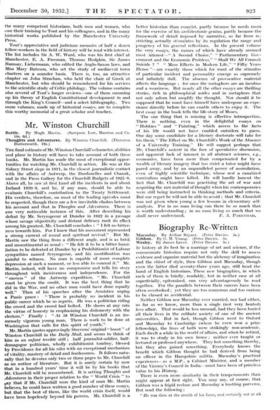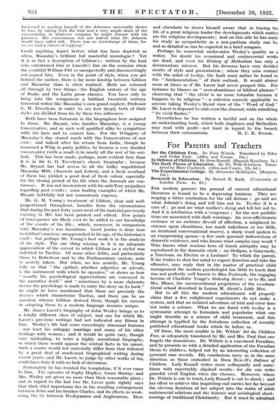Biography Re-Written
Macaulay. By Arthur Bryant. (Peter Davies. 561.)
Gibbon. By G. M. Young. (Peter Davies. 5s.
Wesley. By James Laver. (Peter Davies. 5s.)
IF history at its best be a marriage of art and science, if the consummate historian require not only the skill to assess evidence and organize material but the alchemy of imagination and the chisel of style, then Gibbon and Macaulay, though even the latter died seventy-three years ago, still head the band of English historians. These new biographies, in which, each of them is briefly, readably, but in neither case at all superficially, epitomized, can very advantageously be read together. For the parallels between their careers have been often overlooked ; yet they are too numerous and too curious to be classed as accidental.
Neither Gibbon nor Macaulay ever married, nor had either, so far as we know, more than a single (not very heated) love affair. That would be less unusual, had they been buried all their lives in the celibate society of one of the ancient universities. But in fact, though Gibbon went to Oxford and Macaulay to Cambridge (where he even won a prize fellowship), the lives of both were strikingly non-academic. Each dWelt a while in the world of affairs, and when he retired, it was to study in his own house ; neither ever taught or lectured or professed anywhere. They lost something thereby, but they also gained something. Everybody knows the benefit which Gibbon thought he had derived from being an officer in the Hampshire militia. Macaulay's practical experiences—as a M.P., a Cabinet Minister, and a member' of the Viceroy's Council in India—must have been of priceless value to his History.
There is even more similarity in their temperaments than might appear at first sight. You may say, of course, that Gibbon was a frigid recluse and Macaulay a bustling parvenu. But read the following :
- Ho was then at the zenith of his fame, and certainly not at all backward in availing himself of the deference universally shown to him, by taking both the lead and a very ample share of the conversation, in whatever company he might honour with his presence. His conversation was not indeed what Dr. Johnson would have called talk. There was no interchange of ideas, for no one had a chance of replying."
Could anything depict better, what has been depicted so often, Macaulay's brilliant but masterful monologue ? Yet it is in fact a description of Gibbon's ; written by the host Who entertained him at Lincoln's Inn on the occasion when the youthful William Pitt so unexpectedly and disconcertingly out-argued him. Even in the point of style, when you get behind the surface, there is far more kinship between Gibbon and Macaulay than is often realized. Both are coloured all through by two things—the English oratory of the age of Burke and the Latin prose classics. You have only to bring into the comparison a brilliant twentieth century historical writer like Macaulay's own grand-nephew, Professor G. M. Trevelyan, in order to see how deeply both of their styles are divided from his by these two influences.
Both have been fortunate in the biographers here assigned to them. Mr. Bryant, who handles Macaulay, is a young Conservative, and as such well qualified alike to sympathize with his hero and to correct him. For the Whiggery of Macaulay's day shared much with the Conservatism of our own ; and indeed after his return from India, though he remained a Whig in party politics, lie became a very decided conservative (with a small c) in nearly all the rest of his out- look. This has been made, perhaps, more evident here than it is in Sir G. 0. Trevelyan's classic biography ; because Mr. Bryant has had access to all the bulky unpublished Macaulay -MSS. (Journals and Letters), and a fresh overhaul of them has yielded a good deal of fresh colour, especially
for the closing period of his life when the Journals are con- tinuous. It was not inconsistent with his anti-Tory prejudices regarding past events ; some leading examples of which Mr. Bryant faithfully but not censoriously exposes.
Mr. G. M. Young's treatment of Gibbon, clear and well- proportioned throughout, benefits from the circumstance that during the past forty years most of the material previously existing in MS. has been printed and edited. Few points of consequence are likely ever to be added to our knowledge of the events of his life ; which, moreover, in comparison with Macaulay's was humdrum. Good justice is done here to Gibbon's mastery, unapproached in his age, of the historian's (-raft ; but perhaps Mr. Young's best work is in the analysis of his style. The one thing missing in it is an adequate appreciation of the extent to which Gibbon as a stylist was indebted to Tacitus. Of some other debts, and particularly those to Robertson and to the Parliamentary orators, note is acutely taken. But when, no less acutely, Mr. Young
1 ells us that " the epithet, whether adjective or adverb, is the instrument with which he operates," or shows us how " usually his psychological appreciations are conveyed in i he narrative itself," and " sometimes by a more elaborate
device the psychology is made to carry the story on its back," he ought to have mentioned that these are precisely the devices which characterize Tacitus, and there can be no question whence Gibbon derived them, though his success in adapting them to a modern language remains unique.
Mr. James Layer's biography of John Wesley brings us to a totally different class of subject, and one for which Mr. Laver's previous writings had not indicated any fitness in him. Wesley's life had some exceedingly abnormal features —not least his unhappy marriage and many of his other dealings with women ; and it would be quite easy, though very misleading, to write a highly sensational biography, in which these would appear the central facts in his career. Such a course would not materially differ from that followed by a great deal of much-read biographical writing during recent years ; and Mr. Laver, to judge by other works of his, could have done it with no lack of cleverness.
Fortunately he has resisted the temptation, if it ever came to him. The episodes of Sophy Hopkey, Grace Murray, and Mrs. Wesley are given no more than their reasonable place ; and in regard to the last two Mr. Layer quite rightly says that their chief importance lies in the resulting estrangement between John and his brother Charles, and its effects in weak- ening the tic between Wesleyanism and Anglicanism. Here and elsewhere he shows himself aware that in tracing the life of a great religious leader the developments which matter are the religious developments ; and on this side he has made his study as sympathetic as a non-partisan study can be, and as detailed as can be expected in a brief compass.
Perhaps he somewhat under-rates Wesley's quality as a writer. No doubt his occasional and controversial works are dead, and even his History of Methodism has only a documentary interest. But his Sermons have very decided merits of style and presentation ; where they miss contact with the mind of to-day, the fault must rather be found in the " fundamentalism " of their outlook. It would almost seem at times as if Mr. Laver had never grasped this. For instance he blames an " over-abundance of biblical phrases " observing that ." the cliché is no more tolerable because it happens to be religious "—a criterion scarcely applicable to anyone taking Wesley's literal view of the " Word of God." Mr. Laver is disposed to crab even the Journal, while admitting " its vivid flashes."
Nevertheless he has written a tactful and on the whole an understanding book, which both Anglicans and Methodists may read with profit—not least in regard . to the breach































 Previous page
Previous page